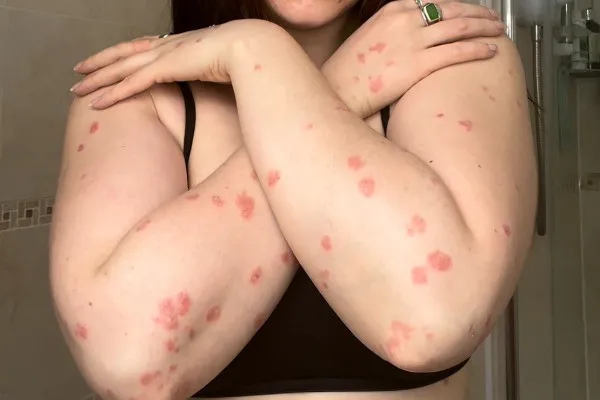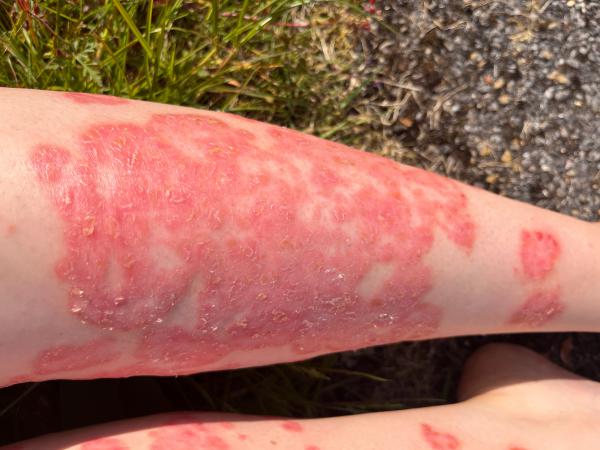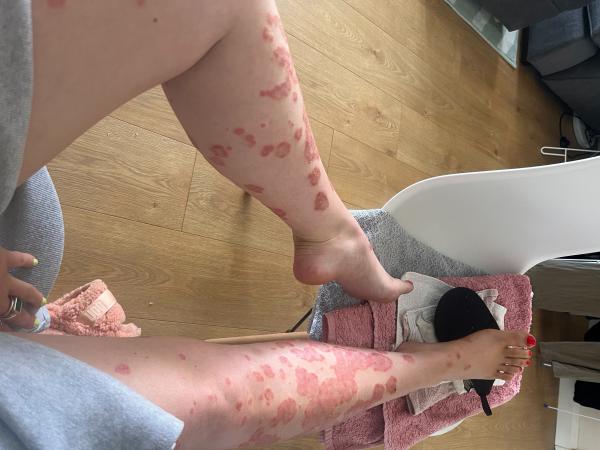
Skinflammation
Georgia Seago shares her experience with guttate psoriasis
I’ve had guttate psoriasis since November 2021. It appeared overnight as a small rash on my lower stomach and upper thighs. Fast forward two years, it covered my legs, arms, back and bum and occasionally sprung up on my face. It was misdiagnosed by various doctors (including aesthetic doctors), and it was actually a podiatrist who eventually suggested psoriasis after noticing a patch on my foot.
In the beginning, I just thought I could live with it, half-heartedly applying steroid cream here and there when it was just a bit of red, itchy skin, but it kept spreading and getting worse until I decided that I definitely couldn’t live with it and I resolved to do something about it because it had started to take a real toll on my mental health. My psoriasis was all I could think about. It was making me more self-conscious than I’d ever been in my life, and the itchiness was unbearable at times. I’d scratch until my skin bled and quickly got used to seeing flakes of skin all over my furniture and on the inside of close-fitting clothes.
I started to research heavily into inflammatory skin conditions and how to get rid of them on pretty much every platform you can think of: online forums, books, social media, podcasts, white papers, and websites. Every day, I was encountering a new “miracle cure” in the form of a cream, pill or plant, but unsurprisingly, these were all too good to be true.

The only solution that consistently came up as being genuinely effective long-term from first-person accounts was a significant change in diet that focused on gut health. So, in March this year, I started working with nutritionist Maz Packham of Nourishful Nutrition.
She specialises in autoimmune conditions (and actually has one herself, which she managed to get under control by addressing her nutrition and lifestyle). She was actually able to come off her medication after working with a nutritionist before she decided to train as one herself, so I finally felt like I had some tangible evidence that this approach could work.
I asked Maz to explain the link between psoriasis and gut health: “A key factor is dysbiosis, which is an imbalance of bacteria in the gut; potentially a lack of commensals and key cornerstone species and an overgrowth of pathogenic or opportunistic types. The result can affect the gut-skin axis, which is a complex relationship between gut health and skin conditions, including psoriasis. The gut microbiome influences the immune system’s activity, and dysbiosis can alter this immune response and lead to inflammation. This is especially relevant in autoimmunity and conditions such as psoriasis because it can promote inflammatory cytokines involved in psoriasis and even promote an autoimmune reaction in the first place.”

The first phase was a very strict elimination diet for six weeks, which sounds intense – and it was – but I got used to it quickly and it was actually pretty “easy” because I had such clear instructions and lots of support from Maz. The idea was to cut out anything that could possibly be inflammatory or allergenic: gluten, dairy, eggs, alcohol, sugar, caffeine, red meat, nightshades, soy, corn, citrus... like I said, it was very strict. One goal was to massively up my plant intake, aiming for 30 different plants a week (including herbs, spices, nuts and seeds), so I prioritised fruits and vegetables, made fresh juices and snacked on fruit, veg and nuts.
Other than that, I was focusing on protein and healthy fats, and the rest of my food was mainly fish, chicken, quinoa, sweet potatoes, homemade soups, and salads - basically a super-nutritious diet rich in fatty acids and detoxifying, nourishing foods that gave my liver and gut a chance to rest and rebalance.
I had herbal teas and matcha instead of coffee and lots of fresh ginger water. I was also taking several supplements throughout the process, which Maz recommended for overall immune and digestion support. During the various protocol stages of my overall plan, these included a liposomal B-vitamin and mineral complex, digestive enzymes, vitamin D3 and K2, glutathione, digestive bitters, silymarin liposomal glutamine, a plant-derived antifungal, a probiotic, omega-3, probiotic powder, and hydrolysed collagen.
A few weeks after starting the initial detox, I did a very in-depth gut-health stool test, which was expensive but so worth it. “There is evidence to demonstrate that those with psoriasis often have an imbalance in their gut microbiome – this can be anything from a reduction in the number of beneficial bacteria and an increase in potentially pathogenic types which can promote or worsen inflammation. A comprehensive stool test analyses the diversity of your individual microbes along with other diagnostics, including (but not limited to) inflammation markers, details on digestive function including protein metabolism, and a marker called zonulin, which can be an indicator (but is not definitive) of gut permeability,” explains Maz.
We got a very detailed report about every aspect of my gut health, which also gave a pretty good picture of my overall health - unsurprising given that 75% of the immune system is in the gut1 – and highlighted several areas where I needed a lot of support, namely dysbiosis, a strep colonisation, fat malabsorption and evidence of immune suppression. This enabled Maz to tailor the supplements for the next phase to exactly what I needed.
This was when we introduced the anti-fungal, probiotic, omega-3, probiotic powder and glutamine.
After around six weeks, I started slowly re-introducing the foods I’d excluded whilst still being mindful of what I was putting into my body and continuing to focus on my overall health and wellbeing with the tools Maz taught me. And while I still don’t know what my triggers are, I do know that cleaning up my diet and working on my gut and liver health worked because around four months after starting working with Maz, my skin started to clear, and the psoriasis patches faded away. It was incredible to watch my skin heal, and I’m so happy I took regular pictures to monitor the progress because once it started getting better, it changed rapidly.
In the months since, I’ve had a lot going on in my personal life, which meant I fell off the diet and supplements big time, and the psoriasis has reappeared, albeit nowhere near as bad as it was. I’m now continuing to work with Maz to prioritise my diet in a more manageable way given the stress I’m experiencing (stress management via nervous system support is also an important part of my plan) because I’ve learnt that consistency is absolutely key, and if you can’t be consistent, you simply won’t see results. Now that I know this approach works, I’m confident that I can stop the current flare in its tracks and manage it back into remission. I really want to give other psoriasis sufferers hope, because you absolutely can heal your skin naturally through diet and lifestyle change – I’m proof!
